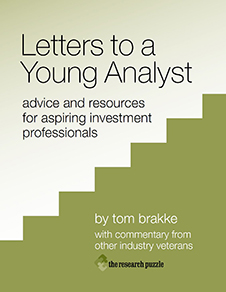
- Thursday, February 23rd, 2012
- assumption hunters
-
Are you an assumption hunter?
The title comes from a piece by Grant McCracken, who (among other things) writes a website with the very descriptive title of This Blog Sits at the Intersection of Anthropology and Economics. I camp out on that corner quite a bit too, so I’ll admit to a fondness for McCracken’s work.
The text of the PDFConvergence Culture Consortium | This is one in a series of papers by C3. is brief, to the point, and very unlike standard-issue academic research. The focus is on businesses and the assumptions that drive them — where those assumptions come from, how they fail, and how hard they are to kill. They get so ingrained that they are invisible for all practical purposes, but they are powerful beyond imagination.
And those assumptions will eventually collide with an evolving world. Therefore, they can’t be viewed in isolation, but in light of what’s on the horizon. That’s tough (and creative) work — anticipating change is easier said than done.
In order to understand what is being presupposed, McCracken outlines a series of “excavations” that identify lingering management models (of whatever vintage); beliefs held dear by the firm (such as the founder’s vision); the clashing ideals of the polyglot of different professions at a company (think of engineers and marketers in a room); and the culture of the industry in which a company operates.
You need assumption hunters to ferret them out, to identify the decaying and destructive ones for what they are and to recognize when a firm is ill-suited for the environment on the horizon. Who should do it? McCracken says such a role is naturally the province of those trained in the liberal arts. (That sound you just heard was a bunch of clicks from investment types, leaving this posting just as I was about to speak to them.)
But when you think about it, what more could I want in an analyst than to be an assumption hunter? One that has deep understanding of the operating model, the financial model, and the tenets of the culture that others don’t see but that will determine whether a firm being covered is a “fit” for the future or not?
And wouldn’t you like to have a portfolio manager that has those abilities? A great one usually understands how different kinds of investors interact and how prices move as assumptions flow from one group to another. Falling in love with a company or stock or an asset class is not what an assumption hunter does.
For someone like me who studies investment decision makers, real assumption hunters are hard to find. It’s so easy to go along with how the investment business operates, with how vehicles are being valued, with whatever is producing returns at a given moment, and whatever the powers that be at your organization happen to favor. Assumption hunters are by their very nature disruptive, pointing to beliefs that are shared without question (and starting up with the questioning soon thereafter).
As a result, they are very valuable. If you work in an investment organization (or for an institutional investor that allocates money) and you have an open slot, I’d counsel you to hire an assumption hunter instead of adding just one more of what you already have. I think you’d get better returns.
Perhaps one day someone will put “assumption hunter” on their business card. It will probably happen more quickly in the world of corporate culture that McCracken wrote about than in the investment ecosystem that I write about. In either case, such a person will make people uncomfortable. That’s the whole point.
